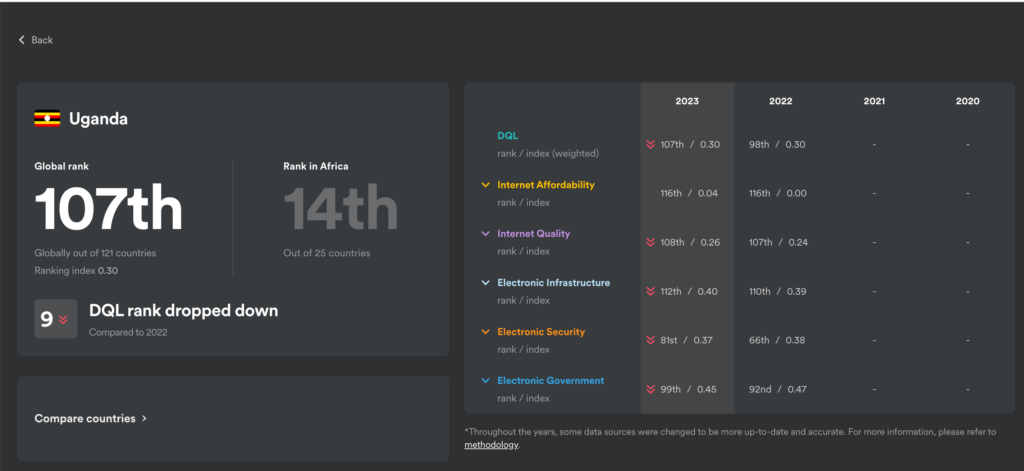Uganda’s digital quality of life ranking has encountered challenges, sliding nine places in the recent Surfshark’s 5th annual Digital Quality of Life Index (DQL). This index, which evaluates digital well-being in 121 countries, sheds light on Uganda’s strengths and areas that demand improvement.
In the E-Security pillar, Uganda performs notably well, securing the 81st position. This pillar assesses the nation’s preparedness to combat cybercrime and its data protection measures, but it still trails behind Kenya.
However, when it comes to Internet Quality, Uganda ranks 108th globally, with internet speeds lagging behind the global average. Fixed internet in Uganda averages 20 Mbps, and mobile internet averages 35 Mbps.
Internet Affordability poses a significant challenge for Ugandans, with citizens having to work substantially longer to afford both fixed and mobile internet compared to many other countries, placing Uganda at 116th.
In terms of E-Infrastructure, Uganda faces hurdles, ranking 112th. The country experiences low internet penetration (39%) and ranks 113th in network readiness, affecting various online activities.
Furthermore, Uganda’s E-Government services fall short of the global average, occupying the 99th position, indicating room for enhancement in digital public services.
Comparatively, Uganda surpasses Tanzania (113th) but trails behind Kenya (76th) in the overall index, indicating regional disparities. Although Uganda has made strides in internet speed, mobile internet remains slower than the global average.

In Summary
- E-Security (81st): Uganda excels in e-security, preparedness to counter cybercrime, and data protection. However, it lags behind Kenya in this pillar.
- Internet Quality (108th): The quality of the internet in Uganda is below the global average. Fixed internet averages 20 Mbps, while mobile internet averages 35 Mbps.
- Internet Affordability (116th): Ugandans have to work significantly longer to afford both fixed and mobile internet compared to many other countries.
- E-Infrastructure (112th): Uganda’s internet penetration is low (39%), and the country ranks 113th in network readiness. Advanced e-infrastructure is essential for various online activities.
- E-Government (99th): Uganda’s e-government services are below the global average, indicating room for improvement in digital public services.
Globally, internet affordability has improved in the past year, with fixed and mobile internet becoming 11% and 26% more affordable, respectively. Uganda faces digital quality of life challenges, primarily related to internet affordability and infrastructure. While it excels in e-security, there is ample room for improvement in other aspects, such as internet quality and e-government services. Addressing these challenges is pivotal in enhancing the overall quality of life for Ugandans in the digital era.







